#{ v: endure }
Explore tagged Tumblr posts
Text
Realistically speaking, I don't think black coffee would kill Harrow. She drinks wine more than once, and I think it's even specified once that it's red; the more tannin rich and strongly flavored of the wines. Evidence suggests that, while she would in no way enjoy it, she could theoretically survive a cup of black coffee.
Therefore the question becomes: Would she? What would she do if she had to choose between keeping her tastebuds or impressing a hot barista? Could lean taut muscle dewy with sweat and steam compel her to do what God could not—finish a hot beverage?
#oh god she watching. she wants to see if you like the coffee she made you. come on. you can't disappont her#Endurance check [godly]: Drink the coffee. just drink it. it will be over soon.#there's nust something v charming to me about imagining Harrow steeling herself and forcing down the coffee bc she wants to impress Gideon#it's her only option#shes too socially awkward to know how to say she was wrong about her preferences without insulting her and she knows it#the locked tomb#harrow the ninth#baristar au#tlt coffee shop au
655 notes
·
View notes
Text
metamy is insane. like.
what if i was the hero you loved gone wrong. defeated and destroyed. rebuilt as my own greatest enemy. what if i lost everything. what if i had been reprogrammed to despise all i had once fought for. what if i couldn't even remember why i had fought at all.
and what if you were made of roses. what if you represented every beautiful thing i once died trying to protect. what if you wore flowers in your hair and cared for small creatures and had eyes the color of the forests i used to call my home. what if you were everything i once loved.
those memories are just out of my reach. infuriatingly. maddeningly. but if anyone knows who i am (who i used to be) it's you. if anyone can make me feel like who i used to be (who i really am) it's you. i can't speak, i can't breathe, i can't remember anything (but you).
you are the world i have been ordered to burn. i am the weapon you have chosen to resist. i was (am) the hero that you loved.
you are my only memory.
#sonic#metamy#metal sonic#amy rose#like. the motifs man. the robot falls in love with rose.#he fought and died to protect nature. her name is AMY ROSE.#he fought and died to protect nature and HE WAS CONVERTED INTO A METAL WEAPON. used against his OWN DREAM.#you are a weapon against yourself. what do you remember? i remember her (i remember failing her)#he's cold. (un)dead. sharp. made of metal. enemy of life. LITERALLY AT WAR WITH HIMSELF (metalsonic v sonic).#she's so so warm. bright. soft. covered in flowers. the only thing that could be good and patient and loving enough to endure him.#it's about his unspoken obsession. he has no mouth he makes no sound he cannot blink or smile or cry.#so he stares in silence at a girl so beautiful and gentle he almost remembers. almost. almost. almost.#all she sees (at first) is a tool. a cold imitation of her love. staring unblinking. unthinking unfeeling.#and then. confusion. and then curiosity.#and when she figures it out. it turns to horror.#BUT THATS FOR LATER!#the best part to me is that weird phase where amy is like. what is this thing doinggg😭 (secretly affectionate) while metal stares at her👁👁#and composes love poem death threats (2 sonic) in his mind.#its about jealousy. im the true sonic. you say you love sonic and im sonic why dont you love me? love me. love me#-> you are kind to me. i had forgotten that feeling. i wont lose it again. so im gonna kill your boyfriend . if thats okay😁beepboop!#the dynamic between amy and sonic and sonics weird undead evil robot clone WHO WANTS TO BE 'THE REAL' SONIC SO BADLY is sooooo yummy.#esp if sonic in turn is like. 'is. is he actually a contender in this. AMY. YOURE BETTER THAN THIS.'#sonic's own sense of ego and entitlement (/pos i love him hes a rat) clashing in two separate forms. two separate lifetimes.#but! that rose! that same rose!!!!!!!!!!!#(clutches head in hands)#.txt
108 notes
·
View notes
Note
Wilson ask: we know Wilson has certain routines he does when interacting with people, e.g. when he was telling Foreman how to tell someone they are dying, do you think he has anything similar with House?
So much of their relationship feels like it stems from them being able to be the worst possible versions of themselves with each other, without fear of the other leaving them, but then Wilson feels sometime like his relationship with House is work and so much of him feels, not like a facade, but planned, like he is always being what he wants to be, if that makes sense, like fake it till you make it. idk.
ooo this is such a good question.
i think this arrangement he has with house highlights not wilson's worst trait, per se, but his most self-destructive one: his addiction to "neediness." i've talked about this lots, but he's attracted to people who need him, and when that need passes, he grows resentful and sabotages things. that's the externally ugly side to him but, internally, i think this stems from a fear of being abandoned. according to house in 5x04, wilson is so scared to lose people that he dumps them before they can leave.
house also has this fear, and has self-destructive tendencies, but they complement wilson's so well: house will always push away someone who seeks to know/help him. wilson, meanwhile, will never stop pursuing it. it's all very blood-type-scene of them.
but back to the idea of their relationship being work/wilson acting "planned" in their dynamic, i think i actually disagree. i think wilson acts like he does to house because house's endless neediness is reliable. turbulent, sure, but it will always be there. wilson's honest state of being (his "worst" state, as you put it) is enabled by house - and vice-versa!
i think when wilson over-extends to other relationships, that's where the "fake it till you make it" comes in. that's not to say that he didn't love amber, for example, but there was a lot of unlearning going on there. i always point to 4x14 and the mattress debacle as a good example; amber was showing wilson how to shed that addiction to neediness/helping people so that he didn't grow tired of her down the line (i also think that's one of the best examples of wilson struggling with compulsive heterosexuality, but i'll just link that post of mine here lol).
there are obviously exceptions to what i've laid out here; wilson does leave and does get royally angry at house. but if we look at the whole show, most people make the understandable choice to move on from house at some point because he does push them too far. wilson, meanwhile, always, always comes back, and tries to pacify himself with the lie that we can't even "pick who our friends are" (5x04). yeah, we can, james. you just have a problem.
lastly (because this is long asf), i think one of the major arcs of the show is house trying to meet wilson halfway and, in the very end, finally getting here. that "work" you mention is rectified, at least to an extent, by the finale - i'll be vague here just in case. house makes The sacrifice of all time for him, and it rings of repayment.
so i think to classify wilson's relationship to house as planned/his worst state of being is more a question of what the show is trying to prove: do the people we love have to bring out the best versions of ourselves, or the honest versions? these 2, one of whom is so concerned with his persona, and the other who is so insistent on the opposite, choose honesty (which 5x17 devotes its entire plotline to). the ability to not front, to not lie, to not pretend, is what keeps these 2 together, despite all their destruction, toxicity, and enabling at times.
#did this make sense? did this answer the question? i hope so#wilson being so angry with house all the time beneath his personas is actually v important#unfortunately house has to endure a lot of what wilson conceals from other people#but idk their mutual toxicity kinda balances the scales in my book#and i must confess that i am often a wilson apologist#james wilson#greg house#house md#hilson#yeah close enough it gets hilson-ed#asks
34 notes
·
View notes
Text
I don't think it's fair that mondays keep happening
20 notes
·
View notes
Text
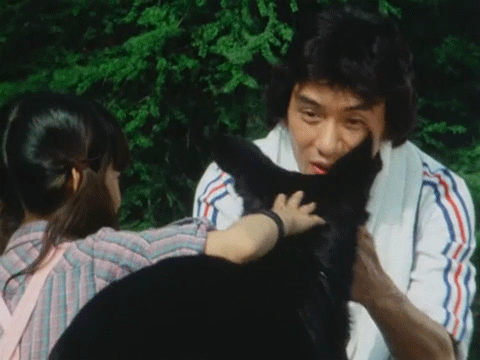
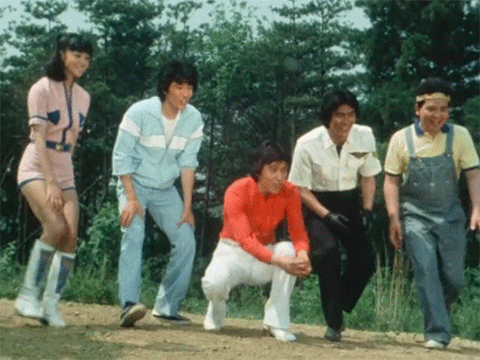
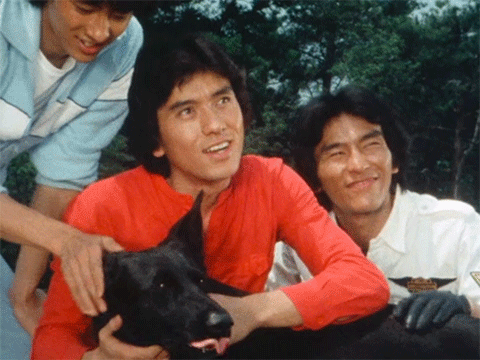
akama + puppy
#i want more goggle v stuff to look at so ur all gonna have to deal with living in goggle v hell with me for a lil while#i appreciate ur enduring understanding <3
21 notes
·
View notes
Text
me every time Jax suffers

#tadc#bein v /lh here just to be clear#hes an asshole and its just satisfying to see him finally endure some Consequences#but in a good way lmao
20 notes
·
View notes
Text
Why Racing and Race Car Movies Are Awesome
“I live my life a quarter mile at a time.” — Dominic Toretto, The Fast and the Furious (2001)
That single line, delivered with quiet conviction in a film about illegal street racing and high-octane heists, has come to define an entire genre and its global fanbase. It captures what draws millions to real-life motorsport and the cinematic universe built around it: living for the thrill, embracing the moment, and risking it all for the win.

At first glance, racing might seem like a simple pursuit of speed. But dig deeper, and you’ll uncover something far more profound. It’s about precision — how a driver can tango with death while maintaining complete control at 200 miles per hour. It’s about danger — where one wrong move can cost everything. And it’s about glory — the split-second decisions that define legends and change history. But perhaps most powerfully, racing is a human story. It’s the tale of rivalries, redemption arcs, team dynamics, and emotional endurance, all wrapped in the roar of engines and the blur of motion.
Race car movies capture these themes in ways few other genres can. Whether it’s the visceral realism of Rush, the corporate drama of Ford v Ferrari, or the street-level grit of Gran Turismo and Fast & Furious, these films not only entertain — they immerse us in the culture, chaos, and craft of speed. They bring the smell of burning rubber, the tension of a starting grid, and the heartbreak of final laps to the screen with their own unique style.
In this blog, we will explore what makes racing — and racing movies — so endlessly compelling. We’ll dive into the human obsession with speed, examine how these stories have evolved on screen, unpack the emotional depth behind the wheel, and celebrate the technical mastery that brings it all to life. From real-life legends to fictional heroes, from pit lane strategy to cinematic slow motion, this is a full-throttle ride into why race car movies aren’t just awesome — they’re essential.
Buckle up. It’s going to be a wild ride.
THE ROOTS OF THE RUSH – WHY HUMANS LOVE SPEED
Speed is ingrained in our DNA. Long before the invention of cars, humanity flourished on the ability to chase, escape, and outpace the competition—whether that competition was a predator, prey, or a rival tribe. That primal instinct to accelerate, to achieve a goal faster than the next person, still resides in us today. And nowhere is that instinct more fully manifest than on the racetrack.
At its core, racing reflects our most fundamental survival instincts: the thrill of the chase, the adrenaline rush from competition, and the deep satisfaction of outpacing someone trying to beat you. In prehistoric times, these skills determined who ate and who starved. In the modern era, they’ve evolved into sport, spectacle, and storytelling — but the emotional charge remains unchanged. When you watch a driver push a machine to its absolute limits, some ancient part of your brain awakens. You don’t need to comprehend all the mechanics to sense the stakes.
There is also a cultural fascination with speed as a symbol of progress. From the Industrial Revolution to the Space Race, each era of human development has been characterized by faster travel, faster communication, and faster innovation. Cars—and by extension, racing—have become emblems of that forward momentum. A high-performance vehicle isn’t merely a machine; it’s a metaphor for how far we’ve come and how much farther we can go. That’s why car launches feel like tech events and why Formula 1 engineers are revered like Silicon Valley disruptors.
But it’s not just speed; it’s speed under control that draws us in. The psychological magnetism of racing lies in its paradox: it’s chaos in harmony. Drivers operate at the edge of disaster, executing inch-perfect maneuvers while managing split-second decisions, mental fatigue, and mechanical unpredictability. It’s ballet at 200 miles per hour. This tension between danger and discipline creates a form of drama that’s difficult to replicate in other sports.
This is what makes real-life racing legends so captivating. Juan Manuel Fangio dominated an era when cars had no seatbelts, helmets were optional, and fatalities were frequent. He was graceful and fearless, driving with a level of precision that defied the limits of mid-century machinery. Decades later, Ayrton Senna emerged not just as a driver, but as a mystical force behind the wheel — a man who seemed to connect with his car on a spiritual level. His duels with Alain Prost were more than just races; they were psychological battles. Then came Michael Schumacher, who rewrote the rulebook on consistency, training, and ruthlessness, turning Ferrari into an unstoppable juggernaut. Today, Lewis Hamilton carries the torch — not just with his record-breaking talent, but with his voice for change, representation, and justice in a sport long defined by privilege.
These legends elevate the sport from spectacle to mythology. Their stories remind us that racing isn’t just about machines — it’s about people mastering those machines under pressure, creating moments of magic that remain with us for years.
This same electric energy transfers into racing films. When we see characters like Niki Lauda or Carroll Shelby brought to life on screen, we’re not just watching actors—we’re witnessing human ambition in its rawest form. It’s no coincidence that so many race car movies focus on true stories; reality, when it comes to motorsport, is already dramatic enough.
In summary, our passion for racing originates from biology, grows through culture, and solidifies in personality. It represents a perfect storm of instinct, innovation, and emotion — a human need for speed enveloped in fireproof suits and carbon fibre.
CINEMATIC HORSEPOWER – THE EVOLUTION OF RACING MOVIES
Racing has always possessed a cinematic quality — the high stakes, the roaring engines, the tension of a close finish. It’s a sport crafted for film, and filmmakers have endeavoured to capture its raw energy since the early days of Hollywood. Over time, racing movies have transformed from experimental art pieces and technical showcases into full-throttle spectacles that balance character-driven storytelling with visceral, edge-of-your-seat action.
The genre’s roots run deep. Films like Grand Prix (1966), directed by John Frankenheimer, brought real F1 racing to the big screen in a groundbreaking manner. Frankenheimer employed experimental camera work, mounting cameras directly on the cars to capture the sense of speed and danger from the driver’s perspective. The result was a visual and technical marvel — a film that felt more like a documentary than a drama. Similarly, Steve McQueen’s Le Mans (1971) exchanged a traditional plot for immersion, offering a nearly wordless homage to endurance racing. These early films focused not on dialogue or character arcs — they were about making audiences feel the sport.
Then came the era of narrative-driven racing films. "Days of Thunder" (1990), starring Tom Cruise, introduced a more Hollywood approach—big personalities, rivalries, romantic tension, and dramatic crashes. It was NASCAR meets "Top Gun," and it worked. The film brought racing to a broader audience and helped cement the idea that motorsport stories could be mainstream hits.
But it wasn’t until the 2000s and 2010s that racing movies truly hit their cinematic stride. The Fast & Furiousfranchise, launched in 2001, shifted gears from illegal street racing to globe-trotting action heists, yet it never lost its core passion for cars and speed. Although critics dismissed the early entries, the series evolved into a cultural juggernaut, blending stunts, family dynamics, and increasingly outrageous set pieces. Despite its departures from realism, the franchise has arguably done more to elevate the visibility of car culture than any other film series in history.
At the opposite end of the spectrum are films like Rush (2013) and Ford v Ferrari (2019), which brought critical acclaim and historical depth to the genre. Rush, directed by Ron Howard, narrates the story of the 1976 F1 season and the intense rivalry between James Hunt and Niki Lauda. With sharp writing, deeply human characters, and thrillingly realistic race sequences, Rush demonstrated how racing could be both emotionally rich and cinematically explosive. Meanwhile, Ford v Ferrari captured the gritty underdog battle between American engineers and the Italian giants at Le Mans in 1966. The film balanced technical detail with character drama, transforming a corporate racing story into an exhilarating emotional journey.
Newer entries, such as Gran Turismo (2023), are pushing the genre even further. Based on the true story of a gamer who became a professional driver through simulation racing, it reflects a changing landscape — where the line between virtual and real racing is increasingly blurred. This modern take adds a new dimension to the genre, illustrating how accessible and transformative motorsport has become in the digital age.
Technically, racing films are among the most challenging and rewarding to produce. The best ones use a combination of practical effects, stunt coordination, and precise editing to simulate the sensation of being behind the wheel. The whine of the engine, the screech of tires, and the gut-punch of a collision are crafted with near-musical precision. A good racing film doesn’t just show speed — it makes you feel it.
More than just popcorn flicks, race car movies reflect the eras in which they are made. They showcase evolving attitudes toward competition, masculinity, teamwork, and even technology. They provide escapism, but also inspire—whether you’re a gearhead, a gamer, or simply someone who enjoys a good underdog story.
From gritty realism to glossy fantasy, racing movies have evolved into a genre as fast-paced and diverse as the sport itself. In every era, they’ve discovered new ways to make our hearts race.
EMOTION IN MOTION – WHY RACING STORIES HIT HARD
On the surface, racing appears as a blur of metal, noise, and speed — but beneath that, it’s profoundly emotional. What makes racing movies truly compelling isn’t just the action; it’s the individuals behind the wheel, their rivalries, the risks they undertake, and the legacies they pursue. These aren’t merely stories about cars — they’re tales of identity, obsession, fear, love, loss, and triumph.
One reason racing stories resonate so deeply is the powerful underdog arc that runs through many of them. In both real life and on screen, motorsport is filled with privateers — smaller, often underfunded teams — challenging industry giants. In Ford v Ferrari, Carroll Shelby and Ken Miles go up against Ferrari’s dominance with limited resources, long odds, and corporate interference. Their battle isn’t just on the track — it’s also about integrity, friendship, and belief in one another. That emotional through-line hits just as hard as any photo finish.
Then there are the iconic rivalries that shape careers and change the sport forever. The most famous cinematic example is "Rush," which chronicles the fierce competition between the flamboyant James Hunt and the disciplined Niki Lauda. Their contrasting personalities—one reckless, one calculating—create emotional tension that extends far beyond race results. The film doesn’t pick a hero; it shows how both men, in their own flawed ways, pushed each other to be better, even at the cost of their health and relationships.
These emotional layers reflect the truth of motorsport: it’s incredibly dangerous. The risk of injury or death is always present, and that ever-looming threat creates an emotional weight that few other sports can match. In reality, fans still mourn the loss of drivers like Ayrton Senna, whose tragic crash in 1994 stunned the world. Films that address these real risks — and the courage it takes to confront them — create a kind of emotional gravity that lingers with audiences long after the credits roll.
Even light-hearted racing films sneak in powerful emotional beats. Talladega Nights may be a comedy, but it addresses fear, failure, and the pressure to meet expectations. Ricky Bobby’s battle to regain his confidence after a crash is surprisingly poignant. Beneath the absurdity, there’s a genuine narrative about redemption and learning to race on your own terms — not just to win, but to remember why you loved it in the first place.
And then there’s Gran Turismo, which taps into a more modern emotional narrative— the dreamer breaking into a closed world. Based on a true story, it follows a young gamer who transforms his passion for a video game into a real-life racing career. His story isn’t just inspirational; it’s deeply relatable. He doesn’t come from wealth or legacy; he comes from persistence, belief, and a pure love of the game. That’s the emotional fuel that powers so many great racing stories.
What all these films share is a willingness to go beyond the track. The best racing movies recognize that what happens inside the car is only half the story. The other half unfolds in the garage, in the hospital room, during arguments with teammates, or in those quiet moments before a race begins. These stories focus on the people who live for racing — and what it costs them.
Ultimately, racing movies resonate deeply because they’re about pursuing something — not just speed or trophies, but meaning, identity, and connection. Whether it’s a driver striving to prove they still belong or a team battling against the odds, these stories reflect a universal truth: we all have something we’re racing toward.
TECHNOLOGY AND TACTICS – BEHIND THE SCENES OF THE TRACK
It’s easy to get caught up in the spectacle of racing — the roaring engines, the flashy cars, the final lap drama — but beneath the surface lies a world of strategy, engineering brilliance, and almost military-level execution. Racing isn’t just about who drives the fastest; it’s about who makes the fewest mistakes, who reads the data correctly, who times a pit stop perfectly, and who can adapt under relentless pressure. This behind-the-scenes reality is where the sport transforms from brute speed into a cerebral battle.
The modern race car is a marvel of engineering. Whether it’s a Formula 1 machine, a Le Mans prototype, or a NASCAR stock car, each component is crafted for speed, endurance, and balance. The aerodynamics alone are incredibly sophisticated — every curve, wing, and duct is designed to optimize downforce while minimizing drag. Engineers utilize wind tunnels, computer simulations, and AI-based telemetry to shave hundredths of a second off lap times. In Formula 1, cars are so finely tuned that even a half-degree of tire camber or a single pound of fuel can impact qualifying.
But technology is only part of the equation. The real-time tactics of a race resemble a chess game at 300 km/h. Teams must determine when to pit, what tires to use, and how to react to weather changes, crashes, or sudden safety car deployments. Drivers have to manage tire degradation, brake temperatures, and fuel loads—all while fending off competitors and keeping the car out of the wall. In endurance racing like Le Mans, drivers must navigate fatigue, night driving, and the risk of equipment failure over 24 brutal hours.
The best racing movies capture these complexities with surprising accuracy. Rush doesn’t just show Hunt and Lauda on the track — it guides us through how weather choices affected tire selection and altered the outcome of entire races. In Ford v Ferrari, the rivalry isn’t just between drivers — it’s also between the engineers and executives. The film illustrates how Carroll Shelby and Ken Miles redesigned Ford’s GT40, tested it under punishing conditions, and navigated internal politics just to get it on the grid. These details add layers of tension and authenticity to the story — and they demonstrate that racing excellence is a team achievement.
Even Gran Turismo, rooted in a video game world, emphasizes the importance of technical knowledge. The protagonist doesn’t simply hop into a real car and go fast — he studies telemetry, adapts his simulation skills to real-world physics, and learns how to communicate with engineers. This fusion of digital and physical mastery is becoming increasingly relevant as sim racing grows in popularity and realism.
What’s remarkable is how racing films simplify these incredibly complex systems without dumbing them down. They give viewers just enough insight to understand why a pit stop can change a race, or why shaving a tenth of a second in qualifying is monumental. You don’t need to be an engineer to appreciate the stakes — yet the best films make you feel like one, at least for a few minutes.
This emphasis on precision and planning sets racing movies apart from other sports films. While many sports hinge on instinct and improvisation, racing strikes a balance between calculation and bravery. It involves the art of pushing a machine to its limits while continually addressing challenges under pressure.
Whether you’re watching a mechanic swap tires in under two seconds or a driver calmly managing brake temperatures while overtaking at 200 km/h, there’s something mesmerizing about the mechanical and mental ballet of motorsport. It’s strategy at full throttle.
FANDOM, FRANCHISES, AND FAST CULTURE
Racing isn’t just a sport; it’s a culture. Moreover, racing movies do more than entertain—they shape and reflect that culture. From die-hard Formula 1 purists to street racers who have built their own rides from scratch, the world of motorsport fandom is vast, passionate, and constantly evolving. Films play a powerful role in drawing people into that world, sparking lifelong obsessions and building global communities along the way.
The fanbase for real-world motorsport is massive. Formula 1 is broadcast in over 180 countries and watched by more than 1.5 billion people annually. NASCAR remains a cultural institution throughout the U.S., while endurance racing, such as the 24 Hours of Le Mans, attracts fans who stay up all night to watch history unfold. Additionally, new formats like Formula E and rallycross are cultivating younger, tech-savvy followings. Racing fans aren’t just spectators — they’re analysts, collectors, sim racers, and gearheads who know their favourite driver’s tire strategy down to the lap.
Racing movies tap into that energy and amplify it. The Fast & Furious franchise is perhaps the best example. What began in 2001 as a modest street-racing crime film evolved into a multi-billion-dollar cultural force. While the franchise gradually shifted from drag racing to globe-trotting heists and spy missions, it has never abandoned its roots in car culture. It helped popularize import tuning, NOS, and drifting—and introduced a generation to terms like double-clutching and heel-toe braking.
But more importantly, Fast & Furious expanded the image of who belongs in racing. Its diverse cast broke the mould of the traditional car movie, representing a variety of backgrounds, cultures, and genders. The message was clear: anyone can be part of the family. That inclusivity inspired car meets, fan conventions, and entire subcultures of modding and racing that continue to thrive today.
At the same time, films like Rush, Ford v Ferrari, and Gran Turismo have attracted viewers who might never have followed motorsport before. These films made the sport emotionally accessible, giving newcomers a reason to care about the rules, the rivalries, and the road to victory. They turned engineers into heroes, made qualifying sessions thrilling, and proved that you don’t have to be a racing expert to get hooked.
Fandom today extends far beyond the track or theatre. Social media has become a significant force in connecting racing communities. Drivers now share behind-the-scenes footage, teams release car reveal videos with movie-level production values, and racing memes circulate widely after every major Grand Prix. Sim racing — especially since the pandemic — has surged in popularity, with games like iRacing, Gran Turismo, and F1 24 blurring the line between fan and participant. In many respects, racing films laid the groundwork for this crossover — turning spectators into drivers, at least virtually.
And let’s not forget the merch. Racing fandom is expressed through diecast cars, replica team gear, movie soundtracks, and even tattoos. Whether it’s a Ferrari cap from Ford v Ferrari, a “Ride or Die” hoodie from Fast & Furious, or a steering wheel mod for your sim rig, the ways fans show their love are as varied as the racing styles they support.
Ultimately, racing films don’t just depict culture — they contribute to building it. They introduce new fans, fuel old passions, and remind us why we care in the first place. They help transform curiosity into commitment, changing a casual movie night into a Sunday ritual of watching qualifying laps and tracking pit strategies.
Racing, at its finest, unites people — in garages, movie theatres, online forums, and around kitchen tables. The stories on screen are merely the starting point. The culture they foster extends well beyond the credits.
THE BEST OF THE BEST – ICONIC RACING FILMS TO WATCH
With so many high-octane films available, it can be challenging to know where to begin. Whether you’re a seasoned motorsport enthusiast or just now diving into the genre, some racing movies stand above the rest — not only for their stunts and spectacle but also for how they capture the essence of speed. These films each offer something unique to the track, ranging from raw emotion and rivalry to technological obsession and sheer fun.
1. Rush (2013)
Ron Howard’s biopic of the 1976 Formula 1 season is a masterclass in character-driven storytelling. It explores the fiery rivalry between James Hunt and Niki Lauda, blending thrilling race sequences with sharp emotional drama. What makes Rush exceptional isn’t just the racing — it’s the contrast between two radically different drivers and the respect that develops between them. Equal parts psychological and adrenaline-fueled, this film is a must-watch.
2. Ford v Ferrari (2019)
A cinematic powerhouse that won two Academy Awards, this film chronicles Ford’s historic 1966 attempt to beat Ferrari at Le Mans. Christian Bale and Matt Damon deliver career-best performances as driver Ken Miles and engineer Carroll Shelby. With sharp dialogue, stunning cinematography, and a profound emotional core, Ford v Ferrari is as much about friendship and integrity as it is about speed and corporate pride.
3. Gran Turismo (2023)
Based on a true story, this underdog tale recounts how a teenage gamer transformed virtual racing skills into a real-life professional career. It’s a film for the new generation — proof that the dream of racing is more accessible than ever. With nods to the iconic PlayStation series and authentic racing sequences, it’s a surprisingly heartfelt journey about proving oneself in an unlikely arena.
4. Le Mans (1971)
Steve McQueen’s passion project is a love letter to endurance racing. With minimal dialogue and a strong emphasis on realism, Le Mans immerses viewers in the raw atmosphere of the 24-hour race. The practical effects and authentic race footage are legendary, setting a standard for authenticity in motorsport cinema.
5. Days of Thunder (1990)
If you enjoy your racing with a side of Tom Cruise charm, this NASCAR drama delivers. Directed by Tony Scott, it offers a fast-paced, flashy glimpse into stock car racing filled with big personalities, romantic subplots, and classic 90s bravado. It helped introduce NASCAR to a broader audience and still stands as an entertaining, albeit over-the-top, ride.
6. Talladega Nights: The Ballad of Ricky Bobby (2006)
A parody that has become a cultural icon, this comedy starring Will Ferrell is as quotable as it is outrageous. Yet, beyond the laughs, Talladega Nights explores genuine themes: fear, ego, and the rediscovery of the joy of racing. Don’t let the humour fool you — it has more heart than you might expect.
Whether you’re in it for the realism, the drama, or simply the pure fun, these films showcase the best of what racing cinema has to offer. Watch them not only to be entertained — but to experience what it truly means to live fast.
THE NEED FOR SPEED, THE POWER OF STORY
Racing isn’t just about what happens on the track — and racing movies aren’t just about cars. They focus on the people who put everything on the line, the risks that make our hearts race, and the timeless drama of competition at its most intense. From the roar of the engines to the quiet determination in a driver’s eyes, these films connect us to something primal and powerful: the drive to go faster, to be better, to win — or at the very least, to survive with honour.
Whether you’re watching Niki Lauda calculate every corner or Dom Toretto launch off a cliff in a Dodge Charger, the thrill remains the same. Racing movies tap into our desire for freedom, control, and redemption. They illustrate how racing is both a science and an art — where tactics meet instinct, and machines become extensions of the human will.
What makes these stories unforgettable is their emotional impact. We cheer not just for the finish line, but for what it represents: the hard-won trust between teammates, the years of sacrifice in the garage, the comeback from tragedy, and the quiet moments before the lights go green. These films allow us to ride shotgun in the moments that matter most.
But perhaps what makes racing and its films truly awesome is the culture they create. It’s a shared language—whether you’re debating Senna vs. Schumacher, quoting "Talladega Nights," or streaming "Gran Turismo" after a sim race session. Racing movies don’t just reflect this culture; they inspire it. They pull new fans into the fold, ignite old passions, and remind us why we ever fell in love with speed in the first place.
So if you haven’t watched these films yet, rev your engines. Whether you seek realism, rivalry, comedy, or pure, pedal-to-the-metal action, there’s a racing movie out there for you. And who knows — maybe it’ll inspire you to hit the track, the gamepad, or the theatre again and again.
At the end of the day, racing isn’t just a sport; it’s a way of life. And racing movies? They’re the stories that keep it alive.
#racing movies#car movies#film recs#movie recommendations#cinema#filmblr#movie fandom#film analysis#motorsport#formula 1#f1#nascar#le mans#endurance racing#car culture#need for speed#rush movie#ford v ferrari#gran turismo movie#fast and furious#talladega nights#days of thunder#le mans 1971#dom toretto#adrenaline junkie#fast cars#speed aesthetic#drive fast#street racing vibes#racingcore
9 notes
·
View notes
Text

#cadillac v-series.r#24 heures du mans#cadillac hertz team jota#circuit de la sarthe#cadillac racing#hypercar#pole position#24 hours of le mans#2025 lemans24#team jota#qualifying#world endurance championship#fia wec
9 notes
·
View notes
Text
max: i just haven't clicked it (the anticheat thing) because i'm just on this warm up server. lorenzo: [inaudible for me bc of that horrible voice changer] max: i know he (lando) has to restart his pc though, so we're just waiting. lando: no, hello ! i'm ready to go ! maxxf... always waiting for one, aren't we? (😭😭??? they were waiting for you babygirl stfu) bk: *losing it* lando: max just type anticheat and launch it. max: it takes a second. lando: fucking hell it has been twenty five ! connor: max has been on aimlabs. lando: fucking hell, how many anti cheats are trying to open up? i just downloaded it quicker than you're pressing it. max: i've clicked launch, so i'm just waiting for it.
a few days ago max told lando as soon as i click go live, you get all proper aggressive and honestly??? he's so right like he wasn't even the one streaming this time but still
#streamer! bk#maxy you're so strong for enduring this </3 your gremlin is a menace#<- not serious btw this is literally their l o v e language#i mean if they've survived almost 14 years of this dynamic they're basically indestructible :]
7 notes
·
View notes
Note
If Henry IV/Henry V/Henry VI reborned as a Queen of Henry VIII, what would they do?
Anon, I gotta congratulate you on one of the wildest asks I've ever gotten. Thanks. Wow. The implications of this question have driven me wild for days. How did this happen? Did Henry VIII look at his kingly predecessors and was like "I know, my ideal woman is a Lancastrian king"? Did Henry IV/V/VI just suddenly wake up in the body of a noblewoman in Henry VIII's reign or were they were born and raised as girls and women? How aware of their past lives are they? So much to consider...
Honestly, I think if Henry IV/V/VI knew who they had been, their reactions would go exactly like this cartoon. Screaming, crying, violence. I think they would react like that just upon realising they were women. I don't want to suggest that royal and noble women didn't possess a great deal of power and freedom - but it was a lot less than their male counterparts and all three Lancastrians had been kings who enjoyed the privileges of rule. This doesn't mean they couldn't have enjoyed life as a woman but it would have meant quite an adjustment. While I think a female Henry V and a female Henry VI might have been tempted into religious life as a way to escape marriage and/or gain access to one of the few ways women could wield power independently of a man, the reign of Henry VIII was... not a great time to pursue that career.
#asks#anon#wow this wild#blinking.gif#um#yeah my money is on henry v dealing the best with suddenly being a woman#he has enough 'haha damn i will endure' energy and enough 'guess i'll die' problem solving skills to even deal with being henry viii's wife#(which i don't think would go well based on what limited things i know about h8 being a half-assed h5 fanboy)
13 notes
·
View notes
Text
bro I need to snap out of this oliver thing whatever it is
9 notes
·
View notes
Text


Periodically think about these descriptions of Bane from 3e Faiths and Pantheons that feel distinctly like elements of Gortash's look in the game. I have to imagine that this is intentional, but it does make it stand out that Bane's avatar is a young man. It feels like an aspect of self-styling that's endured from a much younger age and is reaching its limit, becoming more and more worn out... there's something a little pathetic about that feeling of clinging, isn't there? Evoking the image of this boy-god at such an age? I said the mid life crisis thing last week as a joke, but ahaha, perhaps it's really not. The gap between an aging human with limited time and pristine, unchanging divinity... I find it interesting. Obviously you have two older men in the canon Chosen, but Ketheric unquestionably wears his age with the dignity of a proud patriarch. He dresses as himself, not in the image of a youthful avatar. Perhaps I simply like the contrast evoked by reading this as a form of insecurity or a symbol of power once-potent wearing ever thinner as it reaches its limits.
#I hope I never make another post that's just about that guy ever again. my brain is possessed by a vile curse#I can't believe I'm making a post that's just like 'yeah the slutty v neck and guy fieri shirt are like totally religiously significant'#my spirit endures such indignities#I think about the ages of the Chosen a lot for some reason. shoutout to my friend who got the Orin essay#time for me to fucking sleep#I'm going to overcome my fears of potentially being perceived and tag these things properly. bravely. for organization and blacklist.#bg3#enver gortash#so sayeth emi
23 notes
·
View notes
Text
It seems as if it'll be another one of those nights where the ink dries onto paper yet his bleary vision has the words blurring together into a gradient over parchment. Didn't help that the few candles left burning only supplied some light, straining his only eye through the succumbing darkness.
He breaks from his work. These dockets can be reviewed in the morning before he marks the wrong grid square with his signature and cause a tumble of bureaucracy fixing his one mistake. Kakashi learned from the first ( and hopefully last ) time.
Lounging back into this seat, he pinches between his brows, squeezing out the ache that's been troubling him all night. The considerable effort it would take to carry his sluggish body home did not become him in this moment. In fact, it sounded more alluring to waste away here for the evening, tuck some pillows under neck, and sleep.
He should do better... But better can be next time.
Closed starter — @tamedflames
3 notes
·
View notes
Text
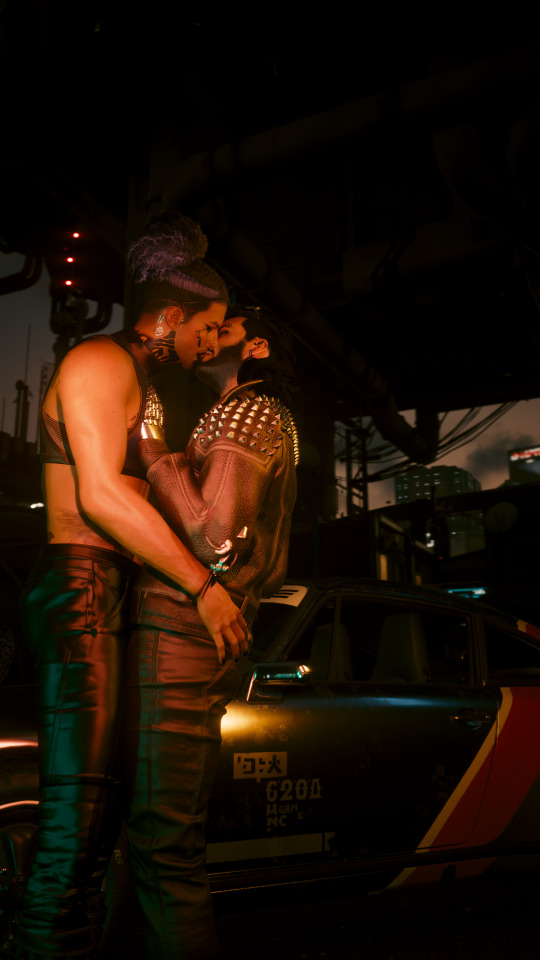
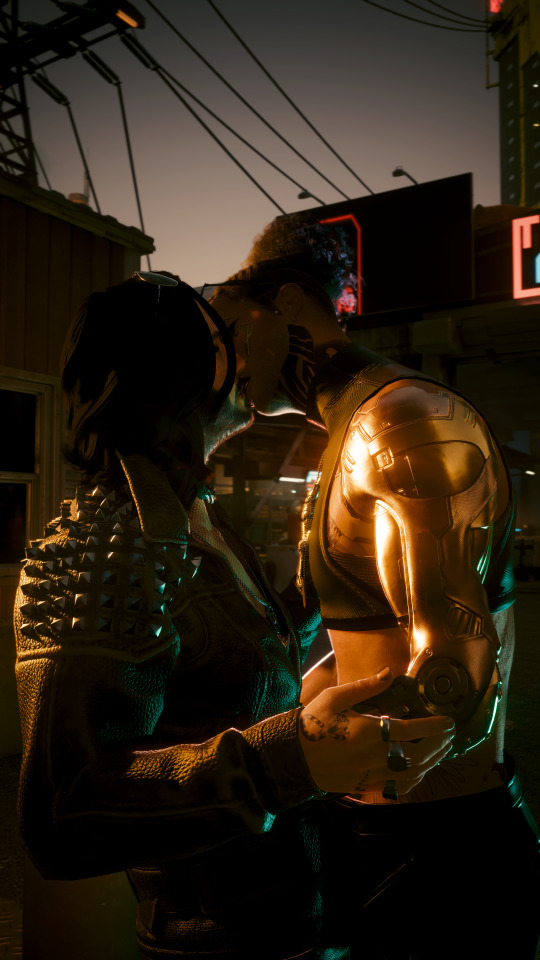
siempre termino extrañándote.
#tr: i always end up missing you#ahdgasjhf they drive me bonkers#been on a roll with this shippy ass vp and i dont think ill stop any time soon yall are just gonna have to endure me#johnny silverhand#silverv#cyberpunk 2077#my vp#cyberpunk photomode#nonbinary v#virgilio suares figaroa
47 notes
·
View notes
Text

showing affection / accepting / @dragetunge

CHEEK, sender kisses receiver's cheek face.
He is nearing sleep when the touch comes, so familiar a feeling upon his scales that he can trace its shape even with his eyes closed and senses dulled with almost-rest. It looks, he is sure, like this: Half Of Him is that good warmth leaning against his neck; His paws, the strokes that know just where to go to soothe and not alarm; and that gentle pressure — special because he receives this from no one else and because He gives this to no one else — is His mouth pressed onto his snout, silly and loving and very so much human in how it means what it means.
I love You, Half Of Him tells him with that very strange, very good pressing-of-mouth-to-scales.
Tired, he rumbles instead of his usual response, teasing, and refuses to move beyond an ear-flap twitch in pretend-annoyance.
Half Of Him hums, teasing as well, and does it again. Higher along the ridge of his eye, louder and pushed firmer against his head as if He is trying to mark I love You!! into even the seams of his scales. It is impossible to hold all of the joy-peace-love-Half Of Me, You are so precious that it sparks in his heart-soul this time, and it spills out of his chest in a low, long purr.
Eyes still closed, he stirs enough to shift his hindlegs and tail, moving them to curl around his precious thing so that his flight-tail lays right over Him. It is he who says I love You then, the way a normal person would: he licks it into His paws, lets all his muscles melt into complete, relaxed trust, and warbles the warble he only gives — will only ever give — to his cherished heart-in-another.
#dragetunge#( them...! them...! first interaction since returning with tooth.less' face slapped on the icon must be them....!#god this has been in the inbox for literal years at this point but better late than never? :'D#i could never purge it of interactions like this! gah! kris!! our boys!! our boyooooos#thank you as ever for your enduring patience with me :sob:#listen i know tooth.less wouldn't be the only one who gets kithes from hic.cup in his life BUT. the only dragon who does...yes? yes...?!#[tooth.less vc] say yes right now SAY YES RIGHT NOW THIS NOT-MONSTER-HUMAN WORD IS ONLY GIVEN TO ONE PERSON (dragon): ME!!#hic.cup's dragon children notwithstanding lkfsjdf )#* dragonscale / ic.#* ic / para.#* dragonscale / answer.#* dragetunge & toothless / alone: we are good. together: we are best.#* v / building paradise.#* intermission / queue.
2 notes
·
View notes
Note
WAIT HOLD UP
When talking about Mei being like Monkey King. There was a really strong parallel in season 3!
It was kinda mentioned already? But I don‘t just mean thematically, in the execution too! The scene Wukong was willing to kill the host child and Mei was willing to burn him, because they felt they had no other choice.
(I think she even mentioned that this is what Monkey King would do. What a hero would do.)
They both even had that small confrontation of "Are you really willing to sacrifice a child/friend?". And both make the tough call that this is something they HAVE to do. Maybe with some guilt, yes, but always without question.
GOD YOU'RE SO RIGHT ANON.
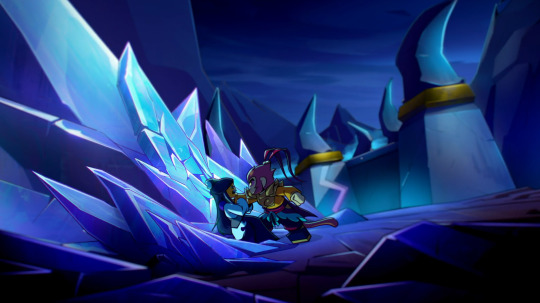
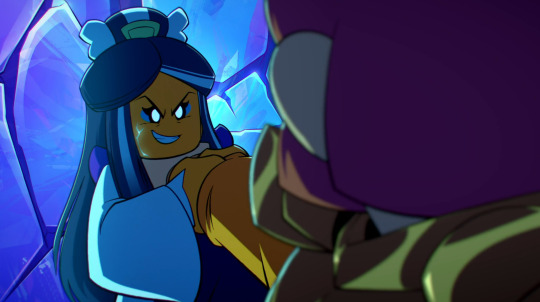
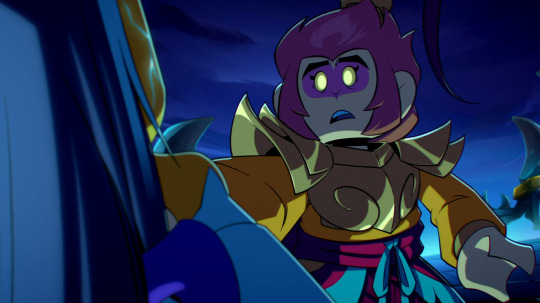
Lady Bone Demon: "Stop! Have you forgotten? Destroy me and you destroy the host. Have you become so desperate to end me that you would sacrifice this blameless, innocent, child?"

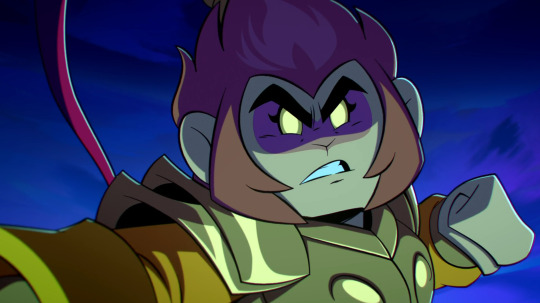
Sun Wukong: "You're giving me no choice! All the time you spent locked away and you haven't changed a bit! I'm going to finish you, like I should have done a long time ago! I told you—you should have stayed buried."
(3x11 This Imperfect World) (Always manifesting this scene for eamk)
-
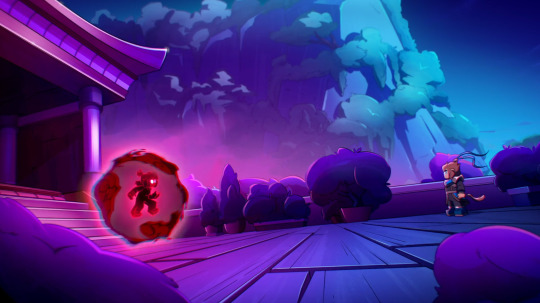
Lady Bone Demon: "*laughs* You think whatever happens to Wukong is of concern to me? He is a vessel—nothing more. You would really destroy your own friends to save yourself?"
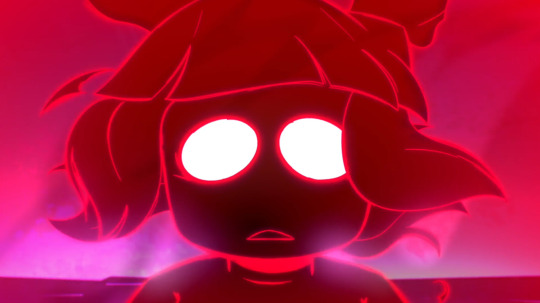
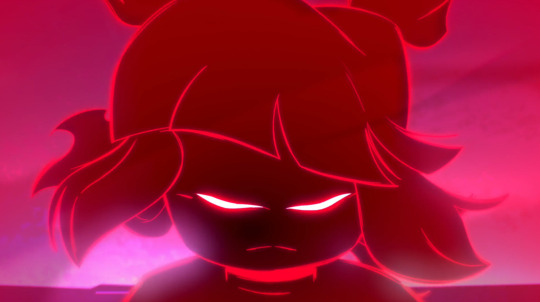
Red Son Voice Over: "Harmonize the wild energies and emotions burning within us and focus them!"

Mei: "Wukong knew the risks, it's what he would do if he had to. That's the hard part of being a hero!"
(3x12 The Corrupted King) (Omg hi hand motif! Hi!!!!)
-
Bonus Secret 3rd Parallel:
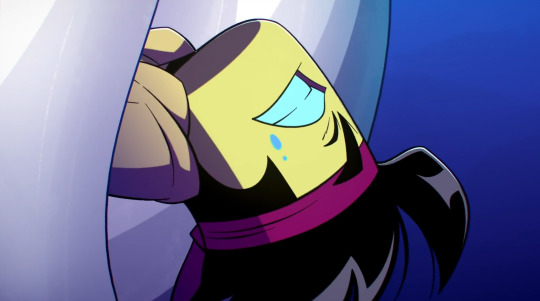
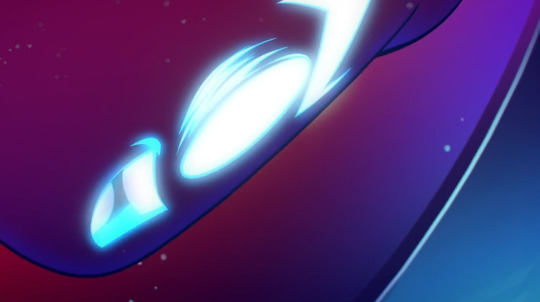
MK: "I'm not gonna let you win!" Lady Bone Demon: "In your thirst to destroy me you used all your powers!" MK: "Not all of them."
(2x10 This is the End!)
-
Some extra thoughts under the cut!
What interests me the most about this parallel is the fact that Mei would totally sacrifice Wukong and Wukong would totally sacrifice that little girl—it's a simply trolley problem for them—but if that person were MK?
I don't think either of them could do it.
Here's where I get into more speculative territory, because personally I think Wukong killed Macaque, and I'm also a believer in EAMK, so I'm going to be plastering a lot of red string!
SO. Would Wukong willingly sacrifice someone who meant so much to him?
You could argue he already did so with Macaque—I think that's what they're setting up anyways. I think Macaque's death is going to fall into place with our continuing "do you sacrifice one person for the many" conflict we have going on here, one that was definitely built upon in 4x13:
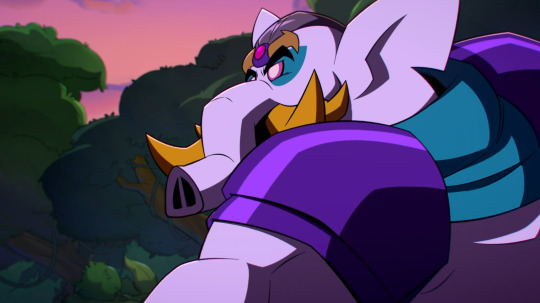
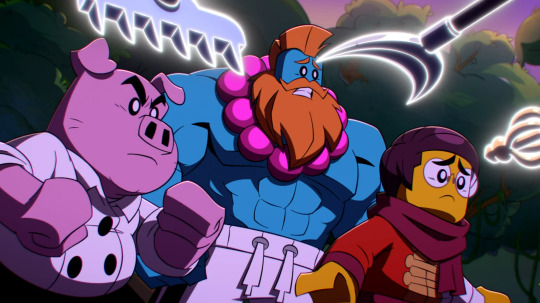
Yellowtusk: "I know full well what would happen should Azure fail but- but he is my brother. I owe him my life!" Sandy: "We get it! I'd do anything to help my friends! But at the cost of the world?" Pigsy: "I'm sorry pal, but NOTHIN' is worth that price!"
(4x13 Rip and Tear)
-
So it seems clear: You sacrifice the one person for the sake of the world.
I think looking at this conflict and using it as a lens to look at Samadhi Fire Mei brings up some interesting points. If Wukong's had pulled off his plan without Macaque or Ne Zha's interference, and then hadn't been able to safely extract the Samadhi Fire from Mei...would Wukong have sacrificed her?
Everyone in 3x10 was willing to sacrifice Mei in a way, to leave her—except MK. MK refused to abandon her, risking himself and the world if he wasn't successful and the Samadhi Fire continued to burn out of control. But in this situation...choosing one person over the world was the right choice.
((Just wanted to point out that both Wukong and Mei are very willing to sacrifice each other which fascinates me. Moving on!))
Wukong himself isn't won't make that sacrifice if he feels there's another option: "You're giving me no choice!" (which I think echoes Mei's "We don't have a choice!" from 3x02)
All of this is a long winded way for me to say that at some point MK is going on the chopping block, either next season or beyond. It's going to be either him or the world, or at least it's going to seem that way, and our protags are going to have to make a very hard choice (omg hi "They will destroy you, harbinger of chaos!").
BUT, BRINGING THIS BACK AROUND TO EAMK.
Wukong won't destroy the one life if he feels he has a choice. This is where baby MK steps in: "all the time [he] spent locked away", and he changed EXTREMELY. To the point where he's basically not the thing that was sealed away in the stone, and very much just a "blameless, innocent, child"—meaning Wukong had a choice.
SO. Basically it's my hope that Wukong already chose MK over the world once, and him and Mei are gonna do it again.
#is there a Mei and Wukong duo name#does anyone know#I am so obsessed with these two fr fr#*sigh* everything I write about goes back to EAMK and samadhi fire part 3 asffads I'm sorry#eamk theory#samadhi fire part 3#lmk Mei#lmk SWK#lmk MK#lmk Sun Wukong#lmk#lmk LBD#lego monkie kid#monkie kid#asks#lmk parallels#Very tired hope these thoughts are coherent!#actually really losing my mind over ''they will destroy you harbinger of chaos'' and like. All of the fucking scenes I transcribed#''Destroy me and you destroy the host.'' ''Would you really destroy your own friends to save yourself?'' ''In your thirst to destroy me''#Like guys I am worried#ohhhhh the SWK V MK fight is so real I can TASTE IT#what is to give light must endure burning#to protect the ones i care about
69 notes
·
View notes